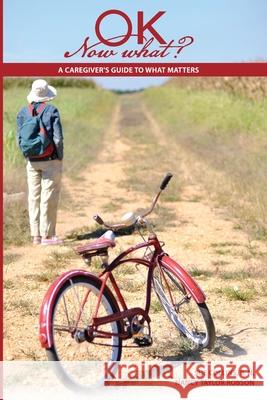OK Now What?: A Caregiver's Guide to What Matters » książka
OK Now What?: A Caregiver's Guide to What Matters
ISBN-13: 9781939632012 / Angielski / Miękka / 2014 / 170 str.
What matters most when someone close to you has been diagnosed as terminal? Time and quality of life for both of you. Coping with both the practical and emotional questions of this challenging passage. We area ll going to die one day, yet every death is individual -- as is the walk toward that individual death both for the one leaving and for the ones they leave behind. Focusing on what truly matters between human beings while taking care of the business of living at the end of life is what this book is about. This book offers: Practical tips for coping with the physical changes that will impact both the person and the caregiver emotionally, physically, financially and spiritually. Advice on what to put in place before the person dies to make things a little easier for those they leave behind. The stories and examples of others to let people know they are not alone Advice and tips for those who are not going to be primary caregiver, but whole are friends, neighbors, colleagues or any other part of the relationships we all share in life There is no perfect way to walk through this time in life. (There's no perfect way to walk through all of life for that matter). But there are good ways to do it. Focusing on what matters while taking care of the practical business of living and dying can make this walk slightly less scary and more rewarding for everyone. How to use this book: Browse the chapter headings; skip around in the TIPS for ways to approach or solve specific problems. Search the Sources lists at the end of the chapters for additional information on a question or need. Read the stories of others' experiences. For the co-worker, the friend and the neighbor, this book offers advice and helpful hints on what to say or do as well as what not to say or do. For the loved one, spouse, and relative it's a practical guide to what you might expect at each stage and offers realistic and reasonable coping strategies. It includes examples born of the experience of a range of people -- professionals in the field as well as no-professionals like yourself -- of what you might experience on this difficult journey. Yet, as we've said, each death is individual just as are the relationships, personalities and personal dynamics involved in each death. Despite the individuality of experience, there are also issues and threads that are universal in human life. This book can act as a practical guide, an encouraging friend, and support, and offers hope for the best possible experience as you help to walk someone home. Across America, 43.5 million people, (nearly one in five adults) care for a loved one 50 or older according to AARP. The Writers: Sue Collins has been a nurse for 38 years and a hospice nurse for 28 years. She has the extensive experience of the professional caregiver and has seen virtually everything at the end of life. As much as anything this book arises out of the OMG I-can't-believe-they-said-that/did-that moments as well as the anger, frustration, grace and poignancy she has witnessed during the last days of patients for whom she has cared. Nancy Taylor Robson, author of three other books, lost her father to bone cancer, which took approximately three years from diagnosis to departure, and her mother-in-law to a long decline and a series of strokes. She has sat by deathbeds and seen more than one friend through the last months, weeks, days and hours of life and knows that as painful a journey as this is, there can be gifts and blessings along the way. She knows, (at least intellectually), that none of us is getting out of here alive."











